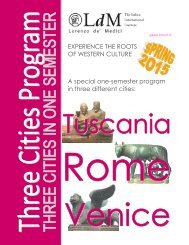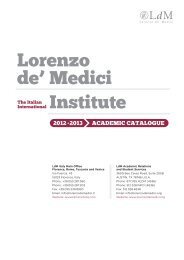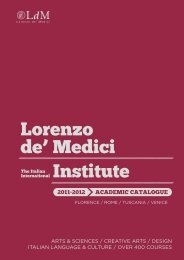aCademiC Catalog 2013-2014 - Lorenzo de Medici
aCademiC Catalog 2013-2014 - Lorenzo de Medici
aCademiC Catalog 2013-2014 - Lorenzo de Medici
Create successful ePaper yourself
Turn your PDF publications into a flip-book with our unique Google optimized e-Paper software.
School of Arts & Sciences ROME<br />
best summed up by the credo “Man – the measure of all things”.<br />
The focus of this course is therefore upon great personalities<br />
of the Italian Renaissance mainly in the fields of the visual arts,<br />
literature and philosophy, but also drawn from those of politics<br />
and civic life. These inclu<strong>de</strong> key figures of the most prominent<br />
Italian families: the <strong>Medici</strong>, the Sforza, the Della Rovere; artists<br />
and architects: Brunelleschi, Leon Battista Alberti, Leonardo<br />
da Vinci, Michelangelo; writers, poets and philosophers: Dante,<br />
Petrarca, Boccaccio, Pico <strong>de</strong>lla Mirandola, Machiavelli, as well as<br />
merchants and bankers. All these individuals left their mark in<br />
Italy between the early 1400s and the late 1500s.<br />
Prerequisites: HIS 130 Western Civilization, or equivalent<br />
Roma: Archaeology of Power<br />
HIS 345 R; Dual listed: CLA 345 R<br />
Cr: 3; Contact hrs: 45<br />
This comprehensive introduction to the archaeology of Rome<br />
from its origins to the collapse of the Roman Empire focuses<br />
on archaeological discoveries old and new in the urban area<br />
of Rome. This approach affords new perspectives on the<br />
evolution of Roman history. By “power” may be un<strong>de</strong>rstood<br />
the ability to join people through a specific social, political and<br />
economical system, the ability to conquer other territories and<br />
other people through military force, culture or religion, and<br />
also the ability to reorganize a space with constructions and<br />
environmental adaptations. In exploring the “archaeology of<br />
power” we will refer to a set of key types of space or structure<br />
(domus, forum, templum etc.) where people lived, worked,<br />
and met with others to organize political, economic and social<br />
life. The main sources of the course are archaeological, but<br />
literary, epigraphic, iconographical evi<strong>de</strong>nce is also addressed.<br />
Stu<strong>de</strong>nts will discover multidisciplinary approaches, and<br />
specific methods and techniques, used by archaeologists to<br />
un<strong>de</strong>rstand and reconstruct our common past. In or<strong>de</strong>r to<br />
stimulate stu<strong>de</strong>nts’ critical approach to historical phenomena,<br />
the course incorporates study of objects and practices from<br />
material culture, and direct contact with the topography of<br />
Rome through site and museum visits.<br />
Prerequisites: HIS 130 Western Civilization, or equivalent<br />
International Business<br />
Introduction to Marketing<br />
BUS 150 R<br />
Cr: 3; Contact hrs: 45<br />
Marketing is a dynamic and an exciting field, a key tool in<br />
confronting the challenges that enterprises are facing every<br />
day. The purpose of this course is to introduce marketing<br />
principles and concepts. In this course stu<strong>de</strong>nts will learn about<br />
the “real” nature and scope of marketing management . They<br />
will be introduced to aspects of marketing, such as: Marketing<br />
Strategy, 4 P’s, Market Planning, Retailing and Wholesaling,<br />
Target Marketing, Market Segmentation, Services Marketing.<br />
You will also learn about the strategic importance of marketing<br />
to an enterprise, whether it be a profit oriented business firm<br />
or non-profit organization.<br />
Introduction to International Marketing<br />
BUS 220 R<br />
Cr: 3; Contact hrs: 45<br />
International competition makes international marketing<br />
one of the most critical skills for business survival. In their<br />
continuing quest for new ways to establish and maintain their<br />
competitiveness, many firms are recognizing the advantages<br />
of operating in an international market. These benefits inclu<strong>de</strong>s<br />
sourcing materials, capital, labor and expertise, relocating<br />
manufacturing, and distributing product and services to new<br />
markets. While there are many benefits, each company must<br />
i<strong>de</strong>ntify the potentially huge risks taken when operating<br />
overseas and the uninformed company may suffer tremendous<br />
set backs before realizing any benefits. This course is an<br />
introduction to the complexities and implications of foreign<br />
markets. Emphasis is on the various economic, social and<br />
cultural factors that impact on international marketing, the 4<br />
Ps (product, price, places of distribution and promotion) and<br />
how these aspects of marketing are influenced by international<br />
business environment.<br />
Prerequisites: BUS 150 Introduction to Marketing, or equivalent<br />
Human Resources Management<br />
BUS 260 R<br />
Cr: 3; Contact hrs: 45<br />
The course explores the Human Resource Management<br />
function in a corporate setting and focuses on the <strong>de</strong>velopment<br />
of knowledge and skills that all managers and lea<strong>de</strong>rs need.<br />
Stu<strong>de</strong>nts learn the basic principles of <strong>de</strong>signing and operating<br />
business organizations, from <strong>de</strong>veloping their mission, vision<br />
and strategy to their key organizational features and processes.<br />
Stu<strong>de</strong>nts face issues of managing people in organizations,<br />
including hierarchy, lea<strong>de</strong>rship, and communication; systems<br />
of reward and recognition; and personnel (from recruitment<br />
to training and <strong>de</strong>velopment). Some attention is given to the<br />
expanding role of corporations in <strong>de</strong>aling with social problems<br />
and issues. The course trains stu<strong>de</strong>nts to build skills relevant<br />
to lea<strong>de</strong>rship and management. These inclu<strong>de</strong> public speaking<br />
and presenting, conflict resolution, teamworking, and business<br />
project management. Class content is <strong>de</strong>livered through<br />
lectures, group discussions, practical and experiential exercises,<br />
and case studies.<br />
Integrated Marketing Communication<br />
BUS 262 R; Dual listed: COM 262 R<br />
Cr: 3; Contact hrs: 45<br />
Marketing communication is one of the most exciting and<br />
stimulating areas in mo<strong>de</strong>rn marketing. Its importance has<br />
grown dramatically in the recent <strong>de</strong>ca<strong>de</strong>s. The means through<br />
which we communicate all around the world have been<br />
affected by the new technological advances. These advances,<br />
such as the Internet, have enabled and eased interaction on a<br />
global scale. Therefore, marketers are looking for new means of<br />
communication that can better gain the attention of customers.<br />
This course will examine the theory and techniques applicable<br />
today to all the major marketing communication functions: ads,<br />
direct marketing, sales promotion, public relations, personal<br />
selling and the Internet. It will allow stu<strong>de</strong>nts to research and<br />
evaluate a company’s marketing and promotional situation and<br />
use this information in <strong>de</strong>veloping effective communication<br />
strategies and programs.<br />
Prerequisites: BUS 150 Introduction to Marketing, or equivalent.<br />
Recommen<strong>de</strong>d: COM 180 Mass Communication, or equivalent<br />
European Policies and Law<br />
BUS 263 R; Dual listed: POL 263 R<br />
Cr: 3; Contact hrs: 45<br />
This course focuses on the process of European integration<br />
and the evolution of the European Union by exploring the<br />
i<strong>de</strong>as and political practices that un<strong>de</strong>rlie this institution. The<br />
course will explore the potential of an emerging political entity<br />
that would at a minimum be an economic super power. The<br />
associated <strong>de</strong>bate over what it means to be a ‘European’ also<br />
raises important issues of political culture and national i<strong>de</strong>ntity.<br />
This course will be divi<strong>de</strong>d into two parts: a first, institutional,<br />
part will emphasis economic aspects, institutions, policies and<br />
legislation of the European Community, the internal market,<br />
the ESCB, the ECB and the euro. A second part, focused on<br />
some parts of the Treaty, will give stu<strong>de</strong>nts specific insights into<br />
commercial policies, and particular emphasis will be given to<br />
transport policy: freedom of movement, competition, taxation<br />
and approximation of laws. The last part of the course is<br />
focused on investigating the transformations that the transport<br />
framework has experienced un<strong>de</strong>r EU rule. Since its foundation<br />
in 1957, the European Union has <strong>de</strong>veloped its scope mostly<br />
in the commercial domain, with acceleration from the end of<br />
the 20th Century, with completion of a Common Market and<br />
of the Monetary Union. Within this framework, transport has<br />
been <strong>de</strong>eply affected by Community action, as an effect of<br />
implementation of both freedom of services and opening of<br />
transport markets. This part of the course is aimed at providing<br />
a general outlook of EU <strong>de</strong>velopments in commercial policies<br />
and a more in-<strong>de</strong>pth analysis of rules on competition and<br />
harmonization of domestic legal and administrative legislation.<br />
Prerequisites: BUS 150 Introduction to Marketing, or equivalent<br />
138<br />
LdM Aca<strong>de</strong>mic <strong>Catalog</strong> <strong>2013</strong>-<strong>2014</strong>





